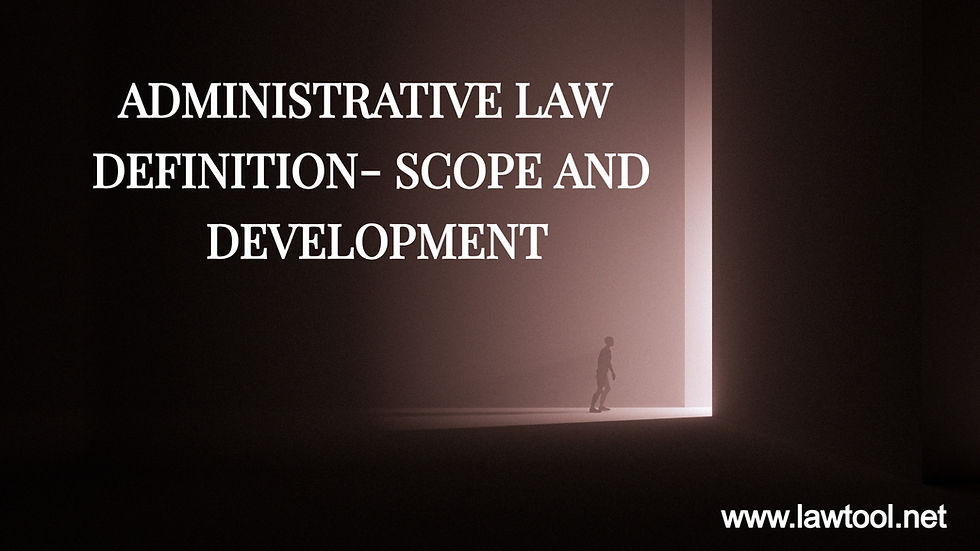ADMINISTRATIVE LAW - IMPORTANT QUESTION
- www.lawtool.net

- Aug 17, 2020
- 4 min read
Updated: Dec 14, 2021
SHORT QUESTIONS
"Rule of law means that the law rules"– Explain.
Administrative law and constitutional law – the relation.
Administrative Tribunals and courts – the difference.
Central Vigilance Commission
Classification of administrative functions.
Commissions of Inquiry – the need.
Constitutional law and Administrative law.
Contractual liability of the Government
Critically comment on the Doctrine of Rule of Law.
Define delegated legislation. Explain how judiciary
Discuss the doctrine against bias.
Discuss the reasons for the growth of delegated legislation.
Discuss the theory of separation of powers and its applicability in India
Doctrine of Estoppel
Doctrine of Separation of Powers
Doctrine of vicarious liability.
Droit administratif.
Explain functions of Lokpal.
Explain the rule of audi alteram partem.
Legislative control of delegated legislation
Lokayukta
Nature and scope of Administrative Law
Ombudsman is the watchdog of the administration – Elaborate.
Point out the differences between Art. 32 and Art. 226 of the Constitution of India.
Point out the relationship between Constitutional Law and Administrative Law.
Promissory Estoppel
Public Corporations – meaning and kinds.
Separation of powers
Since government is a government, law allows certain privileges to the Government Discuss.
Tortious liability of State. :
What do you mean by tortious liability ?
What is a Tribunal ? Point out its differences from a Court.
What is rule of law ?
Writ of certiorari — Explain in brief.
Writ of Mandamus.
Write a short note on the Central Vigilance Commission.
Write an explanatory note on Commissions of Inquiry.
Write note on : The Commission of Inquiry Act.
Write short note on Vigilance Commission.
LONG QUESTIONS
"Excessive delegation of rule-making powers is unconstitutional" – Discuss in view of Delhi Laws Actcase. Which are the functions that can be delegated ?
What is meant by a government contract ? Can the government be made liable for breach of contract ? How ?
Trace the development of the doctrine of promissory estoppel vis-a-vis the State, with the help of decided cases.
Define "administrative law". What are the reasons which have led to the growth of administrative law in the present times ?
"Natural justice represents higher procedural principles which every administrative agency must follow in taking any decision" – Discuss in the light of Judicial pronouncements.
Write a detailed note on the Constitutional remedies available against the State in the light of landmark decisions.
What is meant by discretionary powers of the administration ? How can the exercise of discretionary powers be controlled ?
"Power in the hands of administrative authorities is a public trust which must be exercised in the best interest of the people" – In this context discuss the doctrine of public accountability.
Habeas Corpus case a bad law. Discuss.
The Indian constitution has not indeed recognised the doctrine of separation of powers in its absolute rigidity but the functions of the different parts or branches of the government have been sufficiently differentiated... Justice Mukherjea. Discuss with the help of decided case law.
The presumption is it (Natural Justice) will always apply, however silent about it the State may be. Explain with the help of decided case law.It is not expedient to extend the horizon of Natural Justice involved in the audi alteram partem rule to the twilight zone of mere expectations, however great they may be. Explain with the help of decided case law.
Discuss in detail Sampath Kumar Vs/ Union of India.Explain the Doctrine of Legitimate Expectations with the help of decided cases. “The law has been rightly laid down by the Supreme Court in Vidyawati. Unfortunately within
a very short time a clear departure was made in Kasturilal and the efficacy of the law laid down in Vidyawati was considerably watered down by the Supreme Court.” Discuss.
Describe the control mechanism established in India to exercise various types of control on public corporations.
Explain the necessity of classification of administrative action. Distinguish between administrative function and quasi-judicial function.
Elaborate the need for devolution of adjudicatory authority on administration. State its characteristics.
Elaborate the Writ of Mandamus in detail and substantiate your answer with case laws.
Write about the contractual liability of a State. What are its requirements. Substantiate your answer with case laws.
Elaborate the concept of administrative discretion and judicial review. State how judiciary exercises the control over administrative discretion.
Define Public Corporation. State different kinds of Public Corporation.
Administrative law has been characterized as the most “Outstanding legal development of the 20th century”. Explain the above statement in the light of rapid growth of administrative law.
What is delegated legislation ? How judiciary exercises control over delegated legislation ?
Discuss the judicial controls over Delegated Legislation.
Discuss with the help of case-laws, the liability of the state for tortious acts of its servants.
Discuss the scope of judicial control over discretionary powers of the Administration.
Write an elaborate note on the power of Supreme Court to grant special leave to appeal.Compare U.S. and Indian position on division of powers between organs of the State.
Write a descriptive note on ‘Rule of Law’.
Discuss the different definitions of Administrative Law and point out its nature and scope.
What do you understand by classification of Administrative Functions ? Is it relevant anymore to classify actions as purely administrative and quasi-judicial ?
Discuss the nature and scope of Administrative Law.
State how administrative functions are classified.
How Judiciary exercises control on Administrative actions ?
Write a descriptive note on Rule of Law.
State and explain the reasons for growth of Administrative Law.
What do you mean by Delegated Legislation ?
State and explain legislative mechanism to control delegated legislation.
Compare US and Indian position on division of powers between organs of the State.




Comments